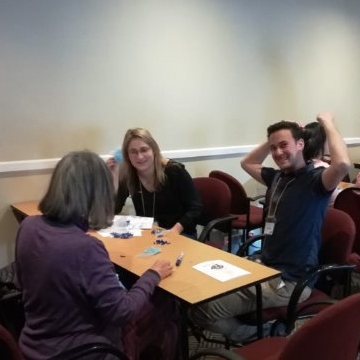click to dowload our latest edition
CLICK HERE TO SUBSCRIBE TO OUR NEWSLETTER


Published
6 years agoon
By
adminJOCELYN ROME
Limmud’s philosophy of cherishing diversity, inclusivity, and equality was in full evidence in the organisation’s Shabbat panel in Johannesburg last week, which discussed the revolution in women’s spiritual and religious leadership. There, the experiences of women across all spectrums of Judaism, some unfamiliar to South African Jews, were presented in a respectful and open manner.
The audience heard from Conservative Rabbi Nina Feinstein, from Nechama Goldstein Barash, an Orthodox Yoetzet or halachic advisor on family purity issues; from Rachel Rose-Reid, a storyteller and Kohenet; and finally from Ann Harris, who gave her perspective as the great-granddaughter, granddaughter, daughter, wife, and mother of Orthodox rabbis.
While all four panellists follow different paths, all are feminists, and spoke to some degree of their journey being driven by a love of Jewish learning. This learning was either a natural continuation of what they experienced growing up, or was a response to perceived exclusion from the way Judaism in their milieu was being practised.
Moderator Nadia-Kruger Levy asked each panellist to reflect on their personal journey to take up a calling as a Jewish leader, and their vision of for what’s next for women’s spiritual and religious leadership.
Feinstein’s journey began in childhood, finding meaning in attending the local synagogue where she was treated as just another valued member of the congregation. Her surprise, at Batmitzvah age, at being told that she could no longer do what she was used to doing, led to lifelong study of Jewish sources and tradition.
She studied for a master’s degree in Talmud and rabbinic literature at the Jewish Theological Seminary, the closest she could come at the time to a rabbinic education. When the Jewish Theological Seminary of the Conservative Movement finally became open to the possibility of rabbinic ordination, she jumped at the opportunity. She spoke about how she broke through the glass ceiling, and the challenges in attracting and helping congregants find meaning in shul services.
Goldstein Barash says that while tradition is the essence and structure of Judaism, she does not accept arguments aimed at protecting Judaism against movements of the modern age where such movements are well founded, measured, and comprehensive. Growing up in a religious home and studying the same texts as her brother gave her the confidence to give a voice to the issues that Jewish women face, and to help them engage in new ways. She insists that attempts to defend tradition by invoking “the slippery slope” argument are not only poorly argued, they also tend to shut down engaging and necessary conversations.
Rose-Reid offered a less cerebral, more mystical path to Jewish tradition, focused on emotional and spiritual connections. A Kohenet, she explained, is not an attempt to emulate the traditional roles played by Kohanim since the times of the Temple, but seeks to embody earth-based transformative Jewish ritual. In essence, the Kohenet Hebrew Priestess Institute, where she studied, attempts to include many of the spiritual and pastoral dimensions of Judaism that may have been lost when the Sages of Yavneh re-imagined Judaism without the Beit Hamikdash.
The final speaker, Ann Harris, the late Chief Rabbi Cyril Harris’s widow, is a self-proclaimed centrist, observing, wryly, that if you walk in the middle of the road, you “often got knocked down”. Nevertheless, in her experience, divisiveness and polarisation in religious affairs tends to prevent honest discussion about women in religious leadership roles.
Harris addressed some of the obstacles faced by women in religious leadership. The main problem is that in spite of great progress, there is still a lack of good Jewish education for women, and a lot of anti-feminist sentiment, from both women and men. Like Goldstein Barash, she cautioned against advances for women in ritual resulting in withdrawal on the part of men. But, she rejected arguments about female leadership being the “thin edge of the wedge” towards abandonment of tradition.
Harris’s final comments summed up the sentiment expressed by all panellists, namely that it is the strides made in Jewish education for women that has enabled them to contribute to the debate, and that they see themselves as playing a role in ensuring the continuation of this trend.
